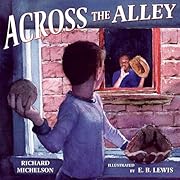

Fai clic su di un'immagine per andare a Google Ricerca Libri.
|
Sto caricando le informazioni... Across the Alley (edizione 2006)di Richard Michelson (Autore), E. B. Lewis (Illustratore)
Informazioni sull'operaAcross the Alley di Richard Michelson
 Nessuno Sto caricando le informazioni...
Iscriviti per consentire a LibraryThing di scoprire se ti piacerà questo libro. Attualmente non vi sono conversazioni su questo libro. Across the alley is an inspirational story involving two children of different ethnicities becoming friends despite the fact that they know they are different from one another. These two boys learned tactics from one another such as playing the violin and playing baseball. These boys were able to teach one another something that came from their culture and family. Having this book in class would be very beneficial when teaching about different cultures, which you might have in your classroom, and want to be educated about. Two friends feel a need to hide their friendship due to their ethnic and religious identities. The clearest indication as to the time in which the story takes place is that one of the boys has a father who "was a starter in the Negro Leagues." (That places it well before the well-integrated Cubs World Series Championship, still at the forefront of this reviewer's mind in November 2016.) The boys -- one African-American, one Jewish -- learn baseball and violin from one another, and challenge some stereotypes simply by living their lives and developing their talents. On one page, an additional connection is made over family histories of Holocaust and American slavery. The Jewish grandparent, a Holocaust survivor, shows some ethnocentric/racist tendencies early in the book, but he quickly responds with warmth and openness, celebrating the natural wisdom of the boys. - Marla S. This is a story about two boys who live across the alley from one another. Willie is black and Abe is Jewish. Every night, when the lights go out, the two open their windows that face each other: “During the day we don’t play together, but at night, when nobody’s watching, Willie and I are best friends.” It turns out that Willie’s dad wants him to be a baseball player, and Abe’s grandpa wants him to play the violin. Neither one of them is on board with these plans, and in fact, each wants to do what the other is supposed to do. So at night, they teach each other; Abe hands Willie his violin and shows him how to play, and Willie helps Abe practice baseball. One night Grandpa hears the violin through Abe’s closed door, comes in, and sees it is Willie who is playing. Abe holds his breath, but then Grandpa says to Willie, “You’ll be the next Jascha Heifetz” and shows him the correct position of the bow. Then Grandpa invites Willie to play the violin at his synagogue. As the four of them walk down the street, Willie’s dad says: “Let people stare. . . . Ignorance comes in as many colors as talent.” After that, Willie’s dad helps Abe pitch, while Grandpa is on the sidelines with the other black parents, cheering away. Light, lovely watercolors by E. B. Lewis capture the emotions of the characters just right. Evaluation: This winning story has lots of good messages and beautiful artwork. nessuna recensione | aggiungi una recensione
Premi e riconoscimentiElenchi di rilievo
Jewish Abe's grandfather wants him to be a violinist while African-American Wille's father plans for him to be a great baseball pitcher, but it turns out that the two boys are more talented when they switch hobbies. Non sono state trovate descrizioni di biblioteche |
Discussioni correntiNessunoCopertine popolari
 Google Books — Sto caricando le informazioni... Google Books — Sto caricando le informazioni...GeneriSistema Decimale Melvil (DDC)303Social sciences Social Sciences; Sociology and anthropology Social ProcessesClassificazione LCVotoMedia: (4.5) (4.5)
Sei tu?Diventa un autore di LibraryThing. |
||||||||||||||||||||||||||||||||||||||||||||||||||||||||||||||||||||||||||||||||||||||||||||||||||||||||||||||||||||||||||||||||||||||||
Like the bestselling The Other Side, E. B. Lewis's striking, atmospheric watercolors bring to life a moving story of baseball and music, and how two young people try to bridge the divide of prejudice. (amazon)